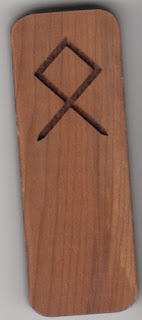This week I'll be using the Greenwood Tarot, created by Chesca Potter and published by Thorsons. The oracle I'll be using is the Rune Cards, created by Tony Linsell and Brian Partridge and published by Anglo-Saxon Books. Today's draws are the Seven of Arrows (Swords) and Homeland (Othila):
Rather than the RWS version of someone stealing swords from another, Potter's illustration shows an insecure person letting her peace of mind be stolen. I recently corresponded with a friend to let them know what was going on with my husband and my fears surrounding his health crisis. I was looking for, in all honesty, support and encouragement. What I got was mostly a litany of all the bad things happening in their life. It felt more like a slap in the face than comfort. But the words of Olmstead and the rune Othila (native land) remind me that my true peace lies within the 'borders' of a stable mind, not any external source. As Charlotte Joko Beck bluntly put it: "Nothing in the world will ever protect us; not our partner not our life circumstances, not our children. After all people are busy protecting themselves. If we spend our life looking for the eye of the hurricane, we live a live a life that is fruitless."











